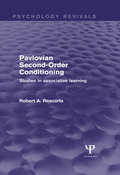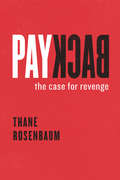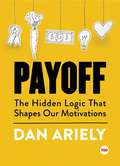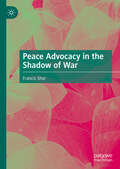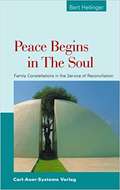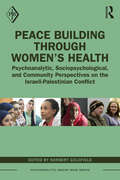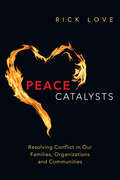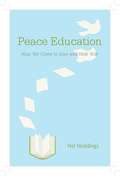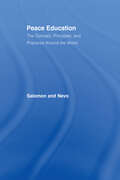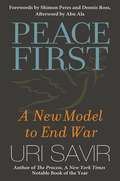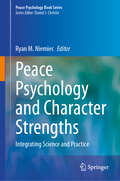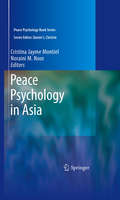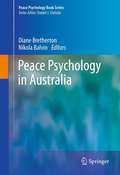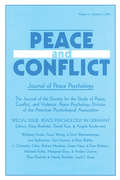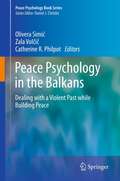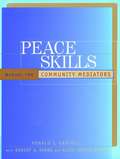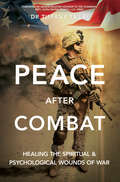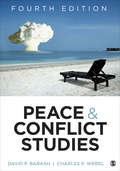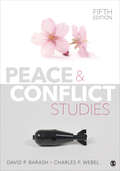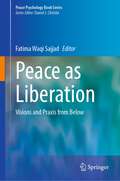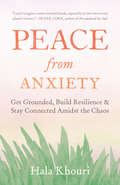- Table View
- List View
Pavlovian Second-Order Conditioning: Studies in Associative Learning (Psychology Revivals)
by Robert A. RescorlaOriginally published in 1980, this volume explores some of the dramatic and exciting changes that had taken place in the field of conditioning in the 15 years prior to publication. The usefulness of a particular learning procedure, second-order conditioning, is explored in three aspects of the learning process: (1) the measurement of learning; (2) the circumstances that produce associative learning; and (3) the content of that learning. The usefulness of this new paradigm is documented with the results of experiments that had grown out of the author’s programmatic work at the time. Completely new results were published for the first time, in an attempt to demonstrate the power of this particular learning procedure in elucidating fundamental questions about the nature of learning.
Payback: The Case for Revenge
by Thane RosenbaumWe call it justice—the assassination of Osama bin Laden, the incarceration of corrupt politicians or financiers like Rod Blagojevich and Bernard Madoff, and the climactic slaying of cinema-screen villains by superheroes. But could we not also call it revenge? We are told that revenge is uncivilized and immoral, an impulse that individuals and societies should actively repress and replace with the order and codes of courtroom justice. What, if anything, distinguishes punishment at the hands of the government from a victim’s individual desire for retribution? Are vengeance and justice really so very different? No, answers legal scholar and novelist Thane Rosenbaum in Payback: The Case for Revenge—revenge is, in fact, indistinguishable from justice. Revenge, Rosenbaum argues, is not the problem. It is, in fact, a perfectly healthy emotion. Instead, the problem is the inadequacy of lawful outlets through which to express it. He mounts a case for legal systems to punish the guilty commensurate with their crimes as part of a societal moral duty to satisfy the needs of victims to feel avenged. Indeed, the legal system would better serve the public if it gave victims the sense that vengeance was being done on their behalf. Drawing on a wide range of support, from recent studies in behavioral psychology and neuroeconomics, to stories of vengeance and justice denied, to revenge practices from around the world, to the way in which revenge tales have permeated popular culture—including Hamlet, The Godfather, and Braveheart—Rosenbaum demonstrates that vengeance needs to be more openly and honestly discussed and lawfully practiced. Fiercely argued and highly engaging, Payback is a provocative and eye-opening cultural tour of revenge and its rewards—from Shakespeare to The Sopranos. It liberates revenge from its social stigma and proves that vengeance is indeed ours, a perfectly human and acceptable response to moral injury. Rosenbaum deftly persuades us to reconsider a misunderstood subject and, along the way, reinvigorates the debate on the shape of justice in the modern world.
Payoff: The Hidden Logic That Shapes Our Motivations (TED Books)
by Dan ArielyBestselling author Dan Ariely reveals fascinating new insights into motivation—showing that the subject is far more complex than we ever imagined.Every day we work hard to motivate ourselves, the people we live with, the people who work for and do business with us. In this way, much of what we do can be defined as being “motivators.” From the boardroom to the living room, our role as motivators is complex, and the more we try to motivate partners and children, friends and coworkers, the clearer it becomes that the story of motivation is far more intricate and fascinating than we’ve assumed. Payoff investigates the true nature of motivation, our partial blindness to the way it works, and how we can bridge this gap. With studies that range from Intel to a kindergarten classroom, Ariely digs deep to find the root of motivation—how it works and how we can use this knowledge to approach important choices in our own lives. Along the way, he explores intriguing questions such as: Can giving employees bonuses harm productivity? Why is trust so crucial for successful motivation? What are our misconceptions about how to value our work? How does your sense of your mortality impact your motivation?
Peace
by David CortrightVeteran scholar and peace activist David Cortright offers a definitive history of the human striving for peace and an analysis of its religious and intellectual roots. This authoritative, balanced, and highly readable volume traces the rise of peace advocacy and internationalism from their origins in earlier centuries through the mass movements of recent decades: the pacifist campaigns of the 1930s, the Vietnam antiwar movement, and the waves of disarmament activism that peaked in the 1980s. Also explored are the underlying principles of peace - nonviolence, democracy, social justice, and human rights - all placed within a framework of 'realistic pacifism'. Peace brings the story up-to-date by examining opposition to the Iraq War and responses to the so-called 'war on terror'. This is history with a modern twist, set in the context of current debates about 'the responsibility to protect', nuclear proliferation, Darfur, and conflict transformation.
Peace Advocacy in the Shadow of War
by Francis ShorFor peace advocates a corollary to Clausewitz’s dictum that “war is politics by other means” might be that other politics could prevent war. By highlighting both individual peace advocates and antiwar/peace organizations from World War I through the wars of the 21st century, the chapters will provide insights into how these individuals and organizations articulated their opposition to and mobilized against specific wars and international/regional conflicts. Organized roughly in chronological order, each chapter will illuminate the socio-historical conditions under which such peace advocacy contested state aggression and armed combat at the national and/or transnational levels. Beyond understanding the specific socio-historical circumstances within which these antiwar and peace advocates and organizations operated and their resultant achievements and failures, the book as a whole will examine the kind of politics that perpetuate war and those that offer a challenge to that perpetuation. Scholars, students, and the general public interested in the history of modern and contemporary wars, peace and conflict studies, and ethical/political perspectives in the 20th and 21st centuries should find much to reflect upon in this book.
Peace Begins in the Soul: Family Constellations in the Service of Reconciliation
by Bert Hellinger Colleen BeaumontIn family constellations, the work of reconciliation begins in the individual soul and in the family. When reconciliation is achieved there, it can spread to larger groups and contexts. In this book, Bert Hellinger inquires into the emotional prerequisites that are necessary for peace and reconciliation. He finds answers in examples from historic conflicts between peoples and cultures. But Hellinger also devotes himself to peace among religions, for example, between Christianity and Islam, as well as to peace between victors and vanquished in the Spanish Conquest, and between masters and slaves in Brazil or the United States.
Peace Building Through Women’s Health: Psychoanalytic, Sociopsychological, and Community Perspectives on the Israeli-Palestinian Conflict (Psychoanalytic Inquiry Book Series)
by Norbert GoldfieldThis book is an examination of the Israeli-Palestinian conflict through psychoanalytic, sociopsychological, and nationalistic lenses, highlighting the successes and the hurdles faced by one organization, Healing Across the Divides (HATD), in its mission to measurably improve health in marginalized populations of both Israelis and Palestinians. Peace Building through Women’s Health begins with a summary of the "peace building through health" field and a psychoanalytic, sociopsychological examination of the Israeli-Palestinian conflict. After a series of informative case studies, the book concludes with an analysis of how this organization has evolved its "peace building through health" approach over the fifteen years since its founding. Working with community groups, HATD has measurably improved the lives of more than 200,000 marginalized Israelis and Palestinians. In the process, it also improves the effectiveness of the community group grantees, by offering experienced management consulting and by requiring rigorous ongoing self-assessment on the part of the groups. IHATD hopes that, in the long term, some of the community leaders it supports will be tomorrow’s political leaders. As these leaders strengthen their own capabilities, they will be able to increasingly contribute to securing peace in one of the longest running conflicts in the world today. Peace Building through Women’s Health will be invaluable to public and mental health professionals interested in international health, peace and conflict studies, and conflict resolution.
Peace Catalysts: Resolving Conflict in Our Families, Organizations and Communities
by Rick Love"If it is possible, as far as it depends on you, live at peace with everyone." —Romans 12:18 Conflict happens. It's a painful reality of life in a fallen world. But we don't need to be content with broken relationships—conflict resolution is possible. God's intention for us and for the world is for all to live in peace with one another, and Christian peacemakers have an unparalleled opportunity to be true ambassadors of reconciliation. Rick Love, founder and president of Peace Catalyst International, shares the principles that have guided his peacemaking efforts around the world. Masterfully blending Scripture and personal experience, he provides a biblical framework for how the God of peace seeks restoration for all who experience conflict—in the home and workplace and even across international borders. With the life of Jesus as the prime example, Love equips and empowers peacemakers of all stripes to integrate evangelical witness with commitment to reconciliation. We can walk in the footsteps of Jesus as catalysts of peace, bringing transformation and hope to a world crying out for healing and forgiveness.
Peace Education: How We Come to Love and Hate War
by Nel NoddingsThere is a huge volume of work on war and its causes, most of which treats its political and economic roots. In Peace Education: How We Come to Love and Hate War, Nel Noddings explores the psychological factors that support war: nationalism, hatred, delight in spectacles, masculinity, religious extremism and the search for existential meaning. She argues that while schools can do little to reduce the economic and political causes, they can do much to moderate the psychological factors that promote violence by helping students understand the forces that manipulate them.
Peace Education: The Concept, Principles, and Practices Around the World
by Gavriel Salomon Baruch NevoPeace Education: * presents views on the nature of peace education, its history, and relationships to neighboring fields; * examines relevant psychological and pedagogical principles, such as the contact experience, conciliation through personal story telling, reckoning with traumatic memories, body-work, and the socio-emotional aspects of reconciliation; and * introduces an array of international examples from countries, such as Croatia, Northern Ireland, Israel, South Africa, Rwanda, and the United States in order to generalize lessons learned. A "must have" for all those thinking, planning, conducting, and studying peace education programs, it is intended for scholars, students, and researchers interested in peace and conflict resolution in higher education and volunteer and public organizations. Its cross disciplinary approach will appeal to those in social and political psychology, communication, education, religion, political science, sociology, and philosophy.
Peace First: A New Model to End War
by Uri SavirPeace First draws on Savir's own deep, first-hand experiences from the Oslo Peace Process, as well as his peace-building efforts between enemies and former enemies in the African nations of Ethiopia, Eritrea, Rwanda, and Sierra Leone.
Peace Psychology and Character Strengths: Integrating Science and Practice (Peace Psychology Book Series)
by Ryan M. NiemiecIn this volume the sciences of peace psychology and character strengths integrate in a substantive way to examine how the positive parts of our personality can contribute and impact each “level” of peace - inner, relational, group, community, international, and ecological peace. Readers will discover a wide range of insights, models, and scholarship; new studies conducted for this volume; and practical strategies to bring greater peace to oneself, one’s relationships, and the world.
Peace Psychology in Asia
by Noraini M. Noor Cristina Jayme MontielIn recent years, peace psychology has grown from a utopian idea to a means of transforming societies worldwide. Yet at the same time peacebuilding enjoys global appeal, the diversity of nations and regions demands interventions reflecting local cultures and realities. Peace Psychology in Asia shows this process in action, emphasizing concepts and methods diverging from those common to the US and Europe. Using examples from China, India, Indonesia, the Philippines, and elsewhere in the region, chapter authors illuminate the complex social, political, and religious conditions that have fostered war, colonialism, dictatorships, and ethnic strife, and the equally intricate personal and collective psychologies that need to be developed to encourage reconciliation, forgiveness, justice, and community. Peace Psychology in Asia: Integrates psychology, history, political science, and local culture into concepts of peace and reconciliation. Highlights the indigenous aspects of peace psychology. Explains the critical relevance of local culture and history in peace work. Blends innovative theoretical material with empirical evidence supporting peace interventions. Balances its coverage among local, national, regional, and global contexts. Analyzes the potential of Asia as a model for world peace. As practice-driven as it is intellectually stimulating, Peace Psychology in Asia is vital reading for social and community psychologists, policy analysts, and researchers in psychology and sociology and international studies, including those looking to the region for ideas on peace work in non-Western countries.
Peace Psychology in Australia
by Nikola Balvin Diane BrethertonThis book is a case study of the development of peace psychology in Australia. While there is, in comparison to other countries, relatively little overt violence, Australia the nation was founded on the dispossession of Indigenous people, and their oppression continues today. Peace Psychology in Australia covers the most significant issues of peace and conflict in the country. It begins with a review of conflict resolution practices among Australia's ancient Indigenous cultures and succinctly captures topics of peace and conflict which the country has faced in the past 222 years since British settlement. The fast population growth, thriving multiculturalism, leadership in international affairs and environmental isolation make Australia a microcosm for the study of human conflicts and peace movements.
Peace Psychology in Germany: A Special Issue of Peace and Conflict
by Klaus Boehnke Daniel Fuss Angela KindervaterFirst published in 2005. This is a special issue of Peace and Conflict, the Journal of Peace Psychology, Volume II, number 3 looks at Peace Psychology in Germany. The papers include old and new antisemitic attitudes, human rights, attitudes towards War, refugees, and results from a German Six-Wave, twenty-year study.
Peace Psychology in the Balkans
by Catherine R. Philpot Olivera Simić Zala VolčičThe volume covers the development of peace psychology in the Balkans. The Balkans is a region marked by post-communist and post-conflict transitional turmoil, and this book provides a comprehensive introduction to research in peace psychology in this part of the world, written by scholars primarily working in the Balkan area. It brings together innovative scholarship that examines interdisciplinary aspects of peace psychology researched and written by scholars from Kosovo, Serbia, Bosnia, Bulgaria, Romania, Macedonia, Croatia, and Slovenia as well as presenting research that responds to contemporary global issues by tracking the ways in which peace psychology is developing and implementing in the Balkans.
Peace Skills: Manual for Community Mediators
by Ronald Kraybill Alice Evans Robert EvansHow to be a "peacebuilder" and mediate between conflicted entities.
Peace after Combat: Healing the Spiritual and Psychological Wounds of War
by Dr. Tiffany TajiriIt could be your neighbor, your coworker, your son, or the woman sitting next to you in church. When combat veterans return from war, they&’re often confused. They struggle to reconnect with their families; the cheering crowds and smothering hugs make them want to jump out of their skin; and sometimes they even long to return to the hell of deployment. What they&’ve experienced in combat can radically change how they view themselves, others, and the world at large. They may have never seen so much hurt, suffering, death, and destruction, which leaves them questioning, &“Where is God?&” Dr. Tiffany Tajiri, a veteran USAF officer and board-certified clinical psychologist, has been in countless sessions with combat veterans and their loved ones and now shares powerful first-hand accounts, lessons, proven exercises, and biblical truth. Whether experiencing combat directly as a veteran or wanting to help bring healing as a family member, pastor, chaplain, or counselor, this book is essential. The emotional, psychological, and spiritual healing encountered applies to anyone facing harsh realities and uncomfortable questions and hoping to find peace again.
Peace and Conflict Studies
by David P. Barash Charles P. WebelThe thoroughly updated Fourth Edition of the gold standard text explores historical and current topics in today’s rapidly changing world to provide a comprehensive introduction to peace and conflict studies. Authors David P. Barash and Charles P. Webel offer an insightful analysis of 21st-century global affairs, including such timely topics as ISIS, the nature of violence and nonviolence, cutting-edge military technologies, the Terrorism and Global Peace Indexes, and the latest developments in Iran, North Korea, and Syria. Comprehensive yet written in a student-friendly and accessible style, the text represents a commitment to inspire readers to create a better world through an understanding of what has happened and what is happening, and therefore what is likely to take place in the future.
Peace and Conflict Studies
by David P. Barash Charles P. WebelPeace and Conflict Studies sets the standard for an accessible introduction, a comprehensive exploration, and analysis of 21st-century world events – including updated coverage of the COVID-19 pandemic, the Middle East, the Social Justice movements within the US, and Global Climate Change. The text examines current conflicts, explores the important aspects of positive peace, individual violence, nationalism, and terrorism, provides numerous visual aids, questions for further study, and suggested readings, and furnishes a comprehensive range of material to enlighten and enrich future discussion and encourage further academic pursuit. With a broad and authoritative scope, this introductory text chronicles a plethora of important global topics from pre-history to the present.
Peace and Conflict Studies
by David P. Barash Charles P. WebelPeace and Conflict Studies sets the standard for an accessible introduction, a comprehensive exploration, and analysis of 21st-century world events – including updated coverage of the COVID-19 pandemic, the Middle East, the Social Justice movements within the US, and Global Climate Change. The text examines current conflicts, explores the important aspects of positive peace, individual violence, nationalism, and terrorism, provides numerous visual aids, questions for further study, and suggested readings, and furnishes a comprehensive range of material to enlighten and enrich future discussion and encourage further academic pursuit. With a broad and authoritative scope, this introductory text chronicles a plethora of important global topics from pre-history to the present.
Peace and Conflict Studies (Conflict And Consciousness Ser. #Vol. 9)
by David P. Barash Charles P. WebelThe thoroughly updated Fourth Edition of the gold standard text explores historical and current topics in today’s rapidly changing world to provide a comprehensive introduction to peace and conflict studies. Authors David P. Barash and Charles P. Webel offer an insightful analysis of 21st-century global affairs, including such timely topics as ISIS, the nature of violence and nonviolence, cutting-edge military technologies, the Terrorism and Global Peace Indexes, and the latest developments in Iran, North Korea, and Syria. Comprehensive yet written in a student-friendly and accessible style, the text represents a commitment to inspire readers to create a better world through an understanding of what has happened and what is happening, and therefore what is likely to take place in the future.
Peace as Liberation: Visions and Praxis from Below (Peace Psychology Book Series)
by Fatima Waqi SajjadThis edited volume highlights a type of violence largely overlooked by peace psychologists; it explores ‘epistemic violence’ which refers to the silencing of the marginalized, racialized and colonized people in the process of knowledge production. This book celebrates the voices and the agency of the subalterns, honoring their visions, testimonies and struggles to push boundaries and create spaces for peace within oppressive environments. “Visions and Praxis from below” refers to peace visions and struggles of the people who live “below the vital ability of shaping the world according to their own vision”. It is a challenge to the hegemonic perspective that ‘credible’ thinking on peace can only be done by the people ‘from above’. This perspective will add to the understanding of not only peace psychologists, but all those who work toward social justice.
Peace from Anxiety: Get Grounded, Build Resilience, and Stay Connected Amidst the Chaos
by Hala KhouriA holistic approach to easing anxiety without hiding from the world's challenges.Overwhelming anxiety and stress--most of us experience these feelings at some point. The challenges in our lives threaten to overpower us at times and the struggles we see in the world further add to the burden. Peace from Anxiety helps us understand the deep roots of our suffering so that we can work toward finding more peace--even in chaos. Therapist and yoga teacher Hala Khouri takes us on a journey to investigate our personal habits, understand our lives, and transform what doesn't serve us. Even though the roots of our anxiety, stress, and pain may feel complicated, healing doesn't have to be.Khouri explores how our brain and nervous system experience stress and discusses how we can begin to get in touch with our body to better understand its signals and how to handle them. She delves deeply into the primary causes of anxiety and offers practical tools for releasing stress and being present with discomfort. Peace from Anxiety discusses topics including trauma, relationships, technology, and working not only for individual healing but also collective healing in our world. Filled with relatable stories and examples, each chapter offers a range of practices and tools to help us find more peace and work for good in our own lives and the lives of others.
Peace from Nervous Suffering
by Claire WeekesThis classic anxiety-relief guide from the author of Hope and Help for your Nerves has brought solace to over a quarter million readers coping with panic attacks and agoraphobia. Dr Claire Weekes offers clear, concise advice to anyone suffering from anxiety: FACE: DO NOT RUN ACCEPT: DO NOT FIGHT FLOAT PAST: DO NOT LISTEN IN LET TIME PASS: DO NOT BE IMPATIENT WITH TIME It may look much too simple, but if you can truly master these four important principles, you are already on your way to rapid recovery. Written in response to great demand from both the medical and psychological communities, as well as from her own devoted readers, Dr. Weekes's revolutionary approach to treating nervous tension is sympathetic, medically sound, and quite possibly one of the most successful step-by-step guides to mental health available.
